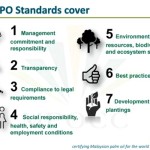The EU’s inaction with respect to ‘palm oil-free’ claims and the EU’s approach to a standard for sustainable palm oil
The issue of palm oil and its sustainability is of increasing importance in palm oil producing countries and just as much in importing countries. Recent improvements in producing countries, however, appear to remain unnoticed in most importing regions, such as the EU. ‘Palm oil-free’ of ‘no palm oil’ claims and labels continue to be placed on products on an increasing number of EU countries, while EU and EU Member States’ authorities ‘sit on the fence’, allow palm oil be denigrated by food business operators and retailers through illegal, mostly deceptive and anti-competitive practices. More importantly, despite great efforts by producing countries to improve the sustainability of palm oil and implement national sustainability standards, the EU looks poised to forge ahead with its own, unilateral sustainability standard, which would likely be detrimental to oil palm farmers around the world and all those involved in palm oil production.
Continued inaction by the EU and EU Member States with respect to ‘palm oil-free’ claims
For many years now, many food businesses and retailers in certain EU Member States have been using ‘no palm oil’ or ‘palm oil-free’ claims and labels on their products, accompanying them with largescale marketing campaigns. These claims and labels are arguably illegal, deceptive and anti-competitive, but EU and EU Member States’ authorities remain inactive. The trend started in France and Belgium, but has recently spread to other EU Member States such as Italy, Spain and Sweden. As long argued, these claims and labels are illegal under EU and EU Member State law.
This marketing and labelling issue plays an important commercial role throughout the EU and is gaining traction around the world. Recently, French supermarket chain Système U intensified its aggressive marketing campaign accompanying its decision to substitute so-called “controversial substances”, including palm oil. On the global scene, in September 2017, the ‘International Palm Oil Free Certification Accreditation Programme’ has been launched. Australia and the UK are the first two countries to have adopted this new trademark and, reportedly, a further 14 (!) countries have applied for the trademark. It appears that this issue, rather than going away, will be of increasing importance going forward, systematically damaging palm oil’s reputation in the hearts and minds of consumers.
On this note, a common and dangerous misconception must be clarified: no EU ruling has, to date, condemned the ‘palm oil-free’ of ‘no palm oil’ labels and campaigns, despite many media claiming this after a recent Court decision in Belgium. In particular, this issue not addressed by the decision by the Brussels Court of Appeals of 2 June 2017 in the case of the Italian food manufacturer Ferrero against the Dutch-Belgian retailer Delhaize. The judgement did not relate to ‘palm oil-free’ claims on Delhaize’s products at all. Rather, the case and the judgment focussed on the fact that the marketing campaign accompanying Delhaize’s ‘Choco’ hazelnut spread stated that Delhaize’s palm-oil free product was healthier and more environmentally friendly because it did not contain palm oil. Most importantly, the Belgian Court stated that Ferrero did not challenge the ‘palm oil-free’ claim on Delhaize’s ‘Choco’ hazelnut spread and, therefore, it did not consider ‘palm oil-free’ claims as such as part of its legal analysis and judgment.
It is high time that these illegal, deceptive and anti-competitive practices be discontinued and that EU and EU Member States authorities finally get involved. This could happen ex officio (although EU Governments’ track record so far has been of total silence and inaction), by means of judicial proceedings triggered before national EU courts, or through administrative recourses before the national EU authorities that are in change of competition law, combating frauds against consumers or deceptive advertisement. The tools exist. The will to trigger them, both by the competent authorities and by the parties being damaged by these commercial practices, is incredibly absent or aloof.
The EU is taking the issue forward – a unilateral EU standard for sustainable palm oil?
Inactive against illegal ‘palm oil-free’ claims and labels, the EU is instead gearing up to regulate palm oil from another angle: standardising the sustainability of palm oil and unilaterally imposing on palm oil producing countries its sustainability requirements.
In recent times, the European Parliament has been particularly focused on the issue of palm oil, deforestation and sustainability. In March 2016, the European Parliament’s Committee on the Environment, Public Health and Food Safety (ENVI) of the European Parliament conducted a public hearing on the issue and, between 2016 and 2017, worked on a report om the issue, which the European Parliament’s plenary adopted, on 4 April 2017, as a ‘Resolution on Palm Oil and the Deforestation of Rainforests’. The Resolution is blatantly anti-palm oil and, while not binding on any EU Institution, has put further pressure on the European Commission and the Council of the EU. The Resolution contains a high number of worrying statements and calls for EU action in ways and forms that will likely be detrimental to palm oil. Most worrisome is its call on “the EU to introduce minimum sustainability criteria for palm oil and products containing palm oil that enter the EU market”. Already at the end of 2016, the Commission had awarded the contract for a ‘Study on the environmental impact of palm oil consumption and on existing sustainability standards’, which is expected shortly. The possibility of the EU developing its own unilateral standard for sustainable palm oil is real and should be resisted.
MSPO is not enough – the need for a truly international standard
Malaysia’s proven efforts to improve the sustainability of its palm oil industry, in particular by having recently introduced a mandatory program requiring all producers to be certified by 1 January 2020, are important steps. Similar ones have been taken by Indonesia with its ISPO scheme and standard. However, while the Malaysian Sustainable Palm Oil (MSPO) certification covers all aspects of palm oil production, from the field to the final product, and also includes protecting forests and wildlife and providing a living wage for everyone employed by this industry, including 400,000 family farmers, it is also a unilateral scheme and suffers of the typical limits of all unilateral instruments. The same goes with Indonesia’s ISPO. Should the EU adopt its own unilateral standard on palm oil, having all Malaysian palm oil producers certified with their compliance with MSPO would serve little to no purpose with respect to the exports to the EU, unless the EU and Malaysia were to agree to bilateral mutual recognition or equivalency under their bilateral FTA, when and if it is concluded. This latter hypothesis looks very remote and quite ‘academic’ at the moment. A unilateral EU standard on sustainable palm oil might significantly disrupt trade between palm oil producing countries and the EU. In Malaysia alone, it could be detrimental for the more than half a million people, whose jobs and livelihoods depend on oil palm cultivation and palm oil production.
The only real option is to achieve a truly international standard for sustainable palm oil, developed and driven by the major palm oil producing countries. The major palm oil producing countries should not only focus on further developing their own national standards, but cooperate towards the negotiation, definition and adoption of a truly international standard that is plurilateral or multilateral in nature. Contrary to another widespread misconception, the development and existence of an international standard for sustainable palm oil does not mean that national standards for sustainable palm oil, such as MSPO, would have to be given up. Quite the contrary. National standards would continue to exist and apply in each respective jurisdiction, but they would be based or conform to the existing international standard, thereby achieving considerable trade facilitation and setting the international benchmark against which national standards would be measured. This international benchmark would also be used to determine whether a future EU standard on sustainable palm oil were to be considered WTO consistent or not.
The key here is that palm oil producing countries must be involved and should pro-actively cooperate to achieve an international standard for palm oil’s sustainability within the appropriate forum. Such venue could be the Council of Palm Oil Producing Countries (CPOPC); which is the natural ambit where palm oil’s sustainability should be discussed, negotiated, defined and adopted. The EU should not be allowed to dictate the sustainability standard for a product that it does not even produce. The EU actions are legitimate, but not ideal and counterintuitive. It would be the equivalent of Malaysia, Indonesia and/or other palm oil producing countries to unilaterally define and adopt a standard on the sustainability of grapes and wine production.
Judging from the EU’s inaction on ‘palm oil-free’ or ‘no palm oil’ claims, Malaysia should not assume that the EU will take a neutral and purely scientific stand in relation to palm oil’s sustainability. This is not happening in relation to the sustainability criteria being adopted by the EU vis-à-vis biofuels and renewable energy. It will likely not happen vis-à-vis palm oil as a whole. The broader palm oil rhetoric in the EU is overwhelmingly negative and occasionally even visibly protectionist. The longer term goal of having national certifications and sustainability labels such as the MSPO logo on palm oil-based products around the world can only become a reality if schemes like the MSPO will eventually be based on a truly international standard and can prevail over unilateral schemes such as those being pursued by the EU or other important palm oil importing countries.
Malaysia and palm oil producing countries must act now. together.
Urgent action is needed. If the issue of standardisation is not tackled internationally, individual countries such as the EU will act unilaterally and without taking into account the positions and interests of the major palm oil producing countries. Unilateral approach and piecemeal standardization is a recipe for disaster. The inaction with respect to illegal, deceptive and anti-competitive ‘no palm oil’ or ‘palm oil-free’ claims, labels and campaigns shows that the EU disregards the interests of palm oil producing countries. Assuming that its attitude will be different with respect to the definition of a standard for palm oil’s sustainability could be a costly mistake. Hopefully, Malaysia and the other key palm oil producing countries will not make. There is some time left to act, but it is running out.
Paolo R. Vergano
Partner, FratiniVergano – European Lawyers










Leave a Reply